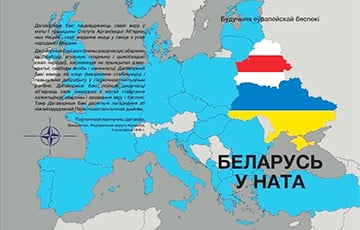Belarus' NATO Membership Will Strengthen Security Of Baltic States And Poland
7- Luīze Līce-Tane
- 9.05.2024, 14:00
- 8,736

What are the benefits and problems of Belarus' potential NATO membership?
Charter97.org goes ahead with the articles from the book "Belarus in NATO", published by the European Belarus Foundation. This article was written by Luīze Līce-Tane, a researcher at the Center for Geopolitical Studies Riga (Latvia).
Since the 24th of February 2022, the geopolitical landscape in Europe has witnessed significant changes as countries, in response to Russia’s war against Ukraine, have had to re-evaluate their defense postures to address the changing security environment. As Belarus is situated between Russia and several North Atlantic Treaty Organization’s (NATO) member states, Russia’s role in the developments taking place in Belarus has further influenced regional security considerations. To understand the role of Belarus in regional security, it is necessary to examine the point of view of Belarus’ neighboring countries, of which Latvia in this article will be analyzed more closely. Due to the geostrategic location of the Baltic States – Estonia, Latvia and Lithuania, these countries have historically been affected by the politics of their neighbors.
Nowadays, while geographically smaller, the Baltic States have great geopolitical significance and, as NATO member states, they have a vital role in safeguarding NATO’s eastern flank. Therefore, disputes between the countries of Eastern Europe and Russia and more recently Belarus’ unpredictability, are of great concern to the Baltic States and has made Latvia more aware of its security vulnerabilities on multiple occasions.
The 2020 Belarusian presidential election witnessed widespread civilian protests and state violence, and the events that followed, added to the unease felt by Belarus’ neighboring countries. Particular examples of this were on the 23rd of May 2021 with the forced landing of a Lithuania-bound civil airline instigated by Belarus, the 2021 migrant crisis and the 2022 Russia’s war against Ukraine exacerbated by the fact that Russia’s invasion of Ukraine was partly launched from Belarus’ territory. As such, in the spring and summer of 2021 Poland, Latvia and Lithuania experienced an ongoing flow of migrants coming from the Middle East via Belarus who were pushed towards the countries’ borders by Belarus’ regime.
The humanitarian crisis was quickly recognized as manufactured by Belarus’ regime and as an act of hybrid warfare. These efforts have illustrated the weaponization of migrants as a tool in a broader effort to put forward Belarus’ political agenda and destabilize the target country and the European Union (EU) as a whole. While Latvia’s border with Russia has been an important factor in its threat assessment, the crisis revealed the necessity to further improve resilience to hybrid threats and border protection with Belarus.
The described events marked a sudden decline in Latvia’s and Belarus’ relations which until 2020 could be described as pragmatic. To illustrate, in 2021 the replacement of the official flag of Belarus with the Belarusian opposition’s white-red-white flag by the Riga city mayor during the Ice Hockey World Championship led to both Latvia and Belarus expelling each other’s diplomats, thus suspending the countries’ diplomatic relations.
Furthermore, in the summer of 2023, against the backdrop of the ongoing Russia’s war against Ukraine, a new security threat emerged in Poland, Latvia, and Lithuania due to the presence of the Wagner Group in Belarus, the private military organization with close ties to Russia. While the threat did not materialize, it reflected the unpredictability of Belarus’ regime. Consequently, the unfolding events in Belarus and Russia’s and Belarus’ military and political cooperation challenges future regional stability and security. Furthermore, the cooperation between Russia and Belarus has added to the complexity of constructing a credible deterrent for the Baltic States and other neighboring NATO member countries.
Thus, if until 2020 relations between Latvia and Belarus were based on practical cooperation, then after 2020 Belarus threatened the national and regional security of Latvia as well as other neighboring countries.
Furthermore, Russia’s war against Ukraine has highlighted the importance and contemporary relevance of NATO and has reminded of the reasons why the Alliance was founded in the first place. Since NATO’s establishment in 1949, the Alliance has had a significant role in shaping Europe’s security landscape. Importantly, NATO’s deterrence and assurance measures in its eastern flank have maintained stability and have also greatly alleviated Latvia’s security concerns especially after the 2014 illegal annexation of Crimea. While Belarus has carried out dialogue and practical cooperation with NATO until 2021, when member states suspended cooperation between NATO and Belarus, it has not expressed a clear intention to pursue NATO membership.
Moreover, the discussion of Belarus’ NATO membership at present is hypothetical. However, in the probability of a democratic transition in Belarus, it may be implied that the country’s long-term security could be ensured if Belarus becomes a NATO member state.
While Belarus’ possible NATO membership has complex and far-reaching implications, as a neighboring country of member states of NATO and the EU, Belarus’ NATO membership may bring positive contributions to Euro-Atlantic security and promote sustainable peace in Europe.
Therefore, in the context of this article, it is useful to consider the possible opportunities and challenges of Belarus’ potential NATO membership according to Latvia’s security perspective.
It may be proposed that Belarus’ potential NATO membership could contribute to regional stability and lead to increased cooperation with neighboring countries by establishing a relationship based on common values of democracy, human rights, and rule of law. Its membership may also encourage cooperation to counter hybrid threats. Additionally, the membership may directly strengthen the security of Latvia by securing the so-called Suwalki Gap. The Suwalki Gap that connects Lithuania and Poland and is located between Russia (Kaliningrad) and Belarus, has been a strategic vulnerability for the Baltic States' security. The takeover of the Suwalki Gap could cut off the only land route for potential NATO reinforcements and isolate the Baltic States from the rest of NATO’s territory.
Therefore, the prospect of Belarus joining NATO would potentially increase the security of the Suwalki Gap by uniting the region. As such, its membership in NATO may strengthen the security of Belarus’ neighboring countries by creating an additional buffer against countries challenging regional security.
Crucially, Belarus' NATO membership would strengthen deterrence by increasing the credibility of deterrence to a potential aggressor as NATO membership offers access to collective defence mechanisms outlined in Article 5 of the NATO treaty, stating that an attack on one member state is considered an attack on all.
It may suggest that Russia has not attacked the territory of a NATO member state due to the risk of triggering collective action. As such, NATO membership would provide Belarus with collective defence guarantees and consequently create a more stable relationship between Belarus and Russia. In the event of an armed attack, Belarus’ membership could also further contribute to Latvia’s security and vice versa due to the countries’ proximity to one another. Therefore, the Baltic States, as well as other neighboring countries, would benefit from a stronger collective defence mechanism and increased deterrence measures in the region.
On the other hand, when considering the strategic relationship between Belarus and Russia and the countries close historical and cultural ties, potential membership may escalate tensions between the two countries. The tensions may also have potential spillover effects in Russia’s relations with NATO and lead to an escalation of tensions in the region. Moreover, as Russia may perceive Belarus’ move towards NATO as a threat to its national security and security interests, Russia may respond with countermeasures to destabilize regional security. Given Latvia’s geographical proximity to Russia and Belarus, such a development would directly affect its national security. Consequently, it can be argued that the most substantial challenge to a neighboring country of Russia aspiring for NATO membership is Russia’s enduring opposition to NATO’s enlargement near its borders.
Considering the Baltic States path to independence and democracy, Belarus can draw valuable lessons from the Baltic States who joined NATO in 2004, even though the country's membership in the Alliance at the time seemed unlikely.
After the Baltic States regained their independence in 1991, the path towards NATO membership presented challenges mainly due to the necessary political, military, and institutional reforms to meet NATO’s membership criteria. However, while Russia at the time communicated its opposition to NATO’s expansion near its borders, Russia was divided and preoccupied with domestic concerns to present a real challenge to the Baltic States joining NATO. Therefore, considering the current geopolitical environment, Belarus’ NATO membership is unlikely until Belarus and Russia change course.
Importantly, the assistance received by the northern neighbors of the Baltic States, the Nordic countries, after the Baltic States regained independence and the resulting partnership between the countries paved the way for the Baltic States membership in NATO and the EU.
Likewise, considering the Baltic States' unwavering support for the Belarusian society in its efforts for freedom and democracy, Belarus in its democratic transition may consider seeking out the support of its immediate neighbors, the Baltic States. For the moment, the future of a democratic Belarus depends on the Belarusian society’s persistence in its efforts to further a democratic transition.
Furthermore, preparatory steps towards integration with NATO should be carried out within the limits of possibilities.
Luīze Līce-Tane - is a junior researcher at Center for Geopolitical Studies Riga. She holds a bachelor's degree in Political Science and a masters degree in International Relations and Diplomacy. Her research interests include the security and defense of the Baltic States, deterrence strategy, Arctic security and military conflict analysis.











